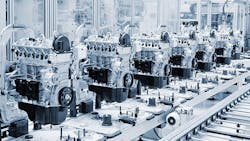In the shadows of the Alps, Swiss companies are confronting a new reality: They won’t be adding manufacturing jobs in the country anytime soon -- not for humans, anyway.
Faced with an unsinkable franc and among the highest average annual wages in the world, Swiss companies looking to expand face a simple choice: Add robots or leave. Fragrance-maker Firmenich International SA chose robots, spending $60 million in the last three years automating a factory outside Geneva to increase capacity by a third with no added staff. In contrast, pump maker Sulzer AG, is closing a facility outside Winterthur, in the canton of Zurich, to move production elsewhere in Europe, which will cost Switzerland 90 jobs.
“Automation is imperative if we want to remain competitive,” Gilbert Ghostine, chief executive officer of Firmenich -- developer of perfumes for designers like Hugo Boss and Issey Miyake -- said in an interview. “We need to keep on reinventing ourselves.”
As populist leaders like U.S. President Donald Trump ratchet up pressure to keep manufacturing at home, Switzerland’s experience shows that it doesn’t necessarily mean more jobs. At the end of March 2016, more than a year after the Swiss National Bank returned to a free float against the euro, Switzerland’s machine, electric and metal sector registered 3% fewer full- and part-time workers than a year earlier, according to industry lobby Swissmem.
Although Switzerland -- where the franc jumped as much as 41% on a single day after the SNB decision and the average annual wage is more than $58,000 -- may be an extreme example, companies in much of the developed world face similar pressures to boost productivity to remain competitive. Robots have even made it to the heart of a French presidential candidate’s economic plan.
South Korea Embraces Robots
Since 2010, global industrial robot sales have risen 16% a year on average, according to the latest figures from the International Federation of Robotics. South Korea has the most as a proportion of overall manufacturing jobs while Germany and Sweden are the leaders in Europe, ahead of the U.S. Switzerland ranks 17th.
Take Swiss candy maker Ricola AG, for example. The company produces some 5.5 billion herbal bonbons each year, a volume-driven business that’s only able to make profits while manufacturing in Switzerland because of its high levels of automation, according to Chief Financial Officer Andreas Lindner.
“We ask ourselves, ‘Can we avoid this process altogether?’ When not, we ask, ‘Can we fully automate it?’ This is what we try to do,” Lindner told a conference in Zurich in November. “We are really trying to automate not just our production sites but also our back office.”
Even High Skill Jobs in Jeopardy
That’s going to happen more and more, Suzanne Fortier, Principal and Vice-Chancellor of McGill University in Montreal, said during a briefing at the World Economic Forum in Davos last month.
“We are going to see a large number of jobs disappearing or changing significantly,” she said. “Obviously, that’s lower skill jobs initially, but with the increased sensory capacity of many of the algorithms right now, we are going to see even higher-skilled jobs in the future disappearing.”
Almost half of all employees in Switzerland’s manufacturing industry are in occupations with a high likelihood of automation, Deloitte said in a 2016 survey. The previous year, a Deloitte/BAKBASEL survey of 400 Swiss machine-building companies found 70% of respondents had increased automation in response to the strong franc. Others have simply moved production to cheaper locations abroad.
Companies like Sulzer felt they had little choice.
“We had to shift outside of Switzerland production that’s just not cost competitive anymore,” CFO Thomas Dittrich said in October. Although the company has automated production in Switzerland for the dental and industrial adhesives markets, products requiring a lot of manual work will be filled by the company in China, he said.
Firmenich’s Swiss rival Givaudan SA had already shifted about a third of its home-market flavor production to Hungary before the 2015 currency upheaval. Last month it said a greater proportion of its ingredients were made in Mexico and China in 2016. The Vernier, Switzerland-based company is also spending $55 million on a new flavors factory in India.
Firmenich stayed put, but its new installation is 90% automated. The company’s decision to keep investing in the canton of Geneva stems in part from its strong connections with local banks and universities developed over its 122-year history.
“The automated plant helped us be more flexible and respond to increased demand, while keeping prices under control,” Anthony Schofield, who oversees the new Firmenich factory, said as barrels of fragrances that will fill perfume bottles including Giorgio Armani’s “Acqua di Gio” and “Flower” by Kenzo rolled along the production line.
On the factory floor, 1,400 ingredients including scents like vanilla, sandalwood and jasmine are transported, measured and mixed via a machine-operated pipe system spanning 60 kilometers (37 miles). Self-driving vehicles ferry barrels around, and product-filled containers are sorted, labeled, wrapped and shipped with little human intervention. The plant’s 200 workers pace the aisles, program robotic arms and oversee processes such as quality control.
The installation is now the largest of the family-owned company’s 28 production sites worldwide and churns out a quarter of its total fragrance output, or 35,000 tons a year.
“It’s much better now,” said Alexandre Esteves, a 17-year company veteran who leads a team at the factory. “There’s less maintenance needed, people don’t have to carry heavy things around as much. We produce more.”
By Alice Baghdjian and Albertina Torsoli
About the Author
Bloomberg
Licensed content from Bloomberg, copyright 2016.
